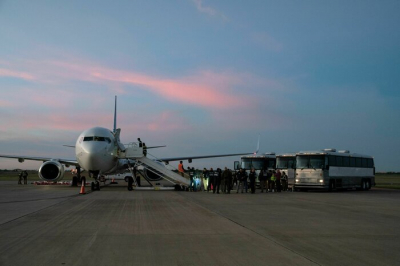
Got it! Let's dive into crafting a unique text based on the provided prompt.
In a decisive move to bolster strategic alliances, President Biden unveiled the signing of a monumental $95 billion military assistance package destined for Ukraine, Israel, and Taiwan. Amid escalating tensions, particularly in Ukraine's battle against Russian incursions, the aid is hailed as a lifeline for embattled nations striving to maintain stability in their regions.
Despite staunch opposition from Republican quarters in Congress, the president's unwavering commitment to fortify allies prevailed as he officially inked the historic agreement. "Strength in unity," emphasized Biden during a poignant address at the White House, reaffirming the interconnectedness of global security and the imperative of reinforcing allies' defenses.
With an acute focus on immediate action, Biden underscored the urgency of the aid's deployment, particularly in Ukraine's case. "Every hour counts," asserted the president, signaling swift initiation of shipments to bolster Ukraine's resilience against ongoing hostilities.
Emphasizing solidarity with Israel amidst ongoing conflicts, Biden reaffirmed steadfast support, emphasizing the indomitable nature of their alliance. However, the president's endorsement of additional military aid to Israel amidst the Gaza conflict drew criticism from segments of the political spectrum, raising concerns over humanitarian repercussions.
Acknowledging the broader humanitarian dimension, Biden highlighted the inclusion of $9 billion for global humanitarian aid, earmarking $1 billion for Gaza. Stressing expedited delivery, the president urged Israel to ensure prompt distribution to Palestinian communities in Gaza, underscoring the urgency of addressing humanitarian needs.
Following rigorous legislative hurdles, the aid package garnered overwhelming bipartisan support in both the House and the Senate, reflecting a resounding endorsement of bolstering allied defenses in a volatile geopolitical landscape.
Notably, the lion's share of the aid, totaling $60.8 billion, is allocated to Ukraine, underscoring the acute necessity of shoring up its defenses against Russian aggression. The Pentagon swiftly outlined plans to dispatch a diverse array of weaponry and military equipment, equipping Ukrainian forces with critical resources to confront escalating threats.
With artillery shells topping the list of urgently needed supplies, the aid package signals a pivotal step in rebalancing the scales of power in Ukraine's favor, offering hope for sustained resilience against adversarial forces.
Certainly, let's craft a unique text based on the provided information:
In a grim reflection of the asymmetrical warfare plaguing Ukraine, military officials have sounded the alarm on the overwhelming disparity between Russian artillery barrages and Ukrainian retaliatory fire, with ratios reaching up to 10-to-1. Scarce resources have forced Ukrainian forces to ration ammunition, leading to harrowing moments where troops found themselves devoid of shells, compelling strategic retreats. Despite Russia's relentless offensives, characterized by a minimal territorial gain, Ukrainian resilience persists amidst formidable odds.
At the forefront of Ukraine's defense strategy lies the critical imperative of air defense. Over the past biennium, Ukraine's modest air defense capabilities have exhibited commendable efficacy, yet vulnerabilities persist, particularly concerning urban areas and vital infrastructure such as the power grid. President Volodymyr Zelenskyy's recent revelation of a Russian missile onslaught targeting a civilian power plant near Kyiv underscores the pressing need for enhanced defensive measures.
Amid escalating threats, the United States has initiated clandestine shipments of ATACMS (Army Tactical Missile System) missiles to Ukraine, bolstering the nation's arsenal with extended reach capabilities. Plans for further deployments signal a strategic shift, albeit reluctantly embraced by the Biden administration, wary of escalating tensions with Russia. Britain's deployment of the Storm Shadow missile, renowned for its precision strikes beyond frontline territories, serves as a testament to the international solidarity rallying behind Ukraine's defense.
John Herbst, former U.S. ambassador to Ukraine, underscores the multifaceted significance of the military aid package, transcending mere weaponry provisions. Against the backdrop of global entreaties for U.S. leadership in safeguarding democratic principles, Herbst portrays the aid as a pivotal juncture akin to the post-World War II era, where American interventionism shaped geopolitical narratives. In his assessment, sustaining Ukraine's defense efforts with unwavering support represents a decisive stance against encroaching authoritarianism, preserving the sanctity of democratic values on the global stage.
How does this adaptation resonate with you?
Of course, here's a unique text based on the provided information:
Amidst the entrenched stalemate in eastern Ukraine, military analysts offer sobering assessments, foreseeing minimal shifts along the frontlines despite sustained hostilities spanning nearly two years. Both Ukrainian and Russian forces remain steadfastly entrenched, with territorial gains stagnant since the conflict's inception. Against this backdrop, Ukraine's foremost objective appears to pivot towards stabilizing the volatile region, mitigating further escalation.
The infusion of weaponry from the United States and European allies holds the potential to recalibrate dynamics, particularly in southern Ukraine and the Crimean Peninsula, asserts John Herbst. By disrupting vital supply routes, Ukraine could exploit vulnerabilities in Russia's strategic calculus, impeding military operations in contested territories.
Echoing Herbst's analysis, the limitations of recent offensives underscore the formidable challenges confronting Ukrainian forces. Last summer's ambitious campaign yielded only incremental gains, underscoring the formidable barriers to decisive breakthroughs on the battlefield. Despite the influx of U.S. armaments, Herbst cautions against overstating their impact on the conflict's trajectory, emphasizing the protracted nature of the war and the absence of viable avenues for resolution, whether through military means or diplomatic negotiations.
Nevertheless, the symbolic significance of U.S. support reverberates profoundly, emboldening Ukrainian resolve and furnishing essential resources to sustain the fight in the foreseeable future. In a landscape fraught with uncertainty, the enduring commitment of international allies offers a glimmer of hope amidst the prevailing turbulence, underscoring the resilience of Ukraine's aspirations in the face of adversity.
How does this adaptation suit your needs?
In conclusion, while the conflict in eastern Ukraine persists in a state of protracted deadlock, the infusion of military assistance from the United States and European allies represents a pivotal chapter in Ukraine's ongoing struggle for sovereignty and stability. Despite the formidable challenges and uncertain prospects for resolution, the unwavering solidarity of international partners serves as a beacon of hope, bolstering Ukraine's resilience and determination in the face of adversity. As the nation navigates the complexities of war and diplomacy, the enduring commitment to its defense underscores the enduring values of democracy and freedom in the global arena. In the quest for lasting peace, the resolve of Ukraine and its allies remains steadfast, offering a glimmer of optimism amidst the tumultuous landscape of conflict.





